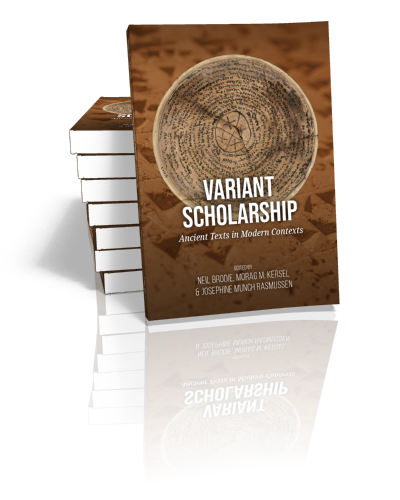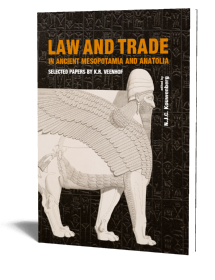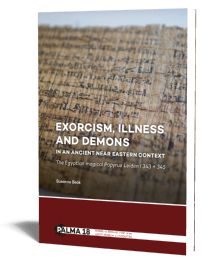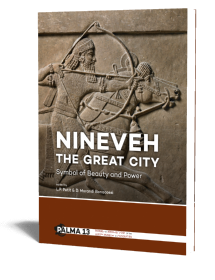Variant scholarship
Ancient texts in modern contexts
Edited by Neil Brodie, Morag M. Kersel & Josephine Munch Rasmussen | 2023

Variant scholarship
Ancient texts in modern contexts
Edited by Neil Brodie, Morag M. Kersel & Josephine Munch Rasmussen | 2023
Paperback ISBN: 9789464270457 | Hardback ISBN: 9789464270464 | Imprint: Sidestone Press Academics | Format: 173x253mm | 248 pp. | Language: English | 12 illus. (bw) | 7 illus. (fc) | Keywords: provenance; ancient texts; context; knowledge production; ethics; antiquities trade; authenticity; ancient and medieval manuscripts | download cover
Read online or downloaded 4884 times
-
Digital & Online access
This is a full Open Access publication, click below to buy in print, browse, or download for free.
-
Buy via Sidestone (EU & UK)
-
Buy via our Distributors (WORLD)
For non-EU or UK destinations you can buy our books via our international distributors. Although prices may vary this will ensure speedy delivery and reduction in shipping costs or import tax. But you can also order with us directly via the module above.
UK international distributor
USA international distributor
-
Bookinfo
Paperback ISBN: 9789464270457 | Hardback ISBN: 9789464270464 | Imprint: Sidestone Press Academics | Format: 173x253mm | 248 pp. | Language: English | 12 illus. (bw) | 7 illus. (fc) | Keywords: provenance; ancient texts; context; knowledge production; ethics; antiquities trade; authenticity; ancient and medieval manuscripts | download cover
Read online or downloaded 4884 times

We will plant a tree for each order containing a paperback or hardback book via OneTreePlanted.org.
Since the eighteenth century, many if not most ancient and medieval manuscripts or other text-bearing or associated objects have been procured through imperial expropriation or through the antiquities market with little or no evidence of findspot or place of original deposition and with no assurance of legal provenance or authenticity. The consequences of these questionable acquisition practices for scholarship and for our understanding of the past are the focus of much enquiry.
Recent high-profile acquisitions (and subsequent returns) of text-bearing objects by prominent private collectors and museums and the appearance on the market of demonstrably modern forgeries have resulted in increased scrutiny of the intellectual and commercial impacts of academic engagement. Scholarly research can abet the antiquities market directly or indirectly through identification, authentication and legitimation of illegally traded text-bearing objects.
These harmful complications of well-established academic practice raise important questions about how and even if the academy should engage with ancient texts and text-bearing objects of uncertain provenance. Through a wide-ranging set of case studies, Variant Scholarship focuses on the methodological, theoretical, and ethical dilemmas facing scholars when working with ancient texts in modern contexts.
This book is intended for those interested in the historical practices of research into ancient manuscripts, ethical quandaries in studying unprovenanced textual materials, and the unintended consequences of scholarly interactions with problematic text-bearing objects.
Variant scholarship: ancient texts in modern contexts
Neil Brodie, Morag M. Kersel, and Josephine Munch Rasmussen
Disciplinary pitfalls: how good philology can mask bad provenance
Nils H. Korsvoll
The provenance of the Dead Sea Scrolls: five examples
Årstein Justnes
Performing papyrology: cartonnage, discovery and provenance
Roberta Mazza
The Ilves Collection: a Finnish manuscript collector and the academic facilitators
Rick Bonnie
Noxious scholarship? The study and publication of First Sealand Dynasty cuneiform tablets
Neil Brodie
Consuming Palmyra
Michael Press
Ethical guidelines for publishing ancient texts
Patty Gerstenblith
The trouble with texts
Morag M. Kersel
The value of forgeries for historical research
Christa Wirth and Josephine M. Rasmussen
Someone else’s manuscripts: the ethics of textual scholarship
Liv Ingeborg Lied
Between representation and the real: the forgeries of Constantine Simonides
Rachel Yuen-Collingridge
Provenance: genocide. The transfer of Armenian sacred objects to art collections
Heghnar Zeitlian Watenpaugh
Digitizing manuscripts and the politics of extraction
Raha Rafii

Dr. Neil Brodie
Neil Brodie was a Research Associate on the Endangered Archaeology in the Middle East and North Africa project at the University of Oxford. He has published widely on issues concerning the market in cultural objects, with more than fifty papers and book chapters devoted to the subject.

Dr. Morag M. Kersel
Morag M. Kersel is Associate Professor of Anthropology at DePaul University. In addition to participating in archaeological excavations and surveys in Israel, Jordan, and Palestine, she is interested in the relationship between cultural heritage law, archaeological sites and objects, and local interaction. She also works on the public display and interpretation of archaeological artifacts in institutional spaces. She has published a number of articles and is the co-author (with Christina Luke) of U.S. Cultural Diplomacy and Archaeology: Soft Power, Hard Heritage (2013) and co-editor (with M.T. Rutz) of Archaeologies of Text: Archaeology, Technology, and Ethics (2014).

Dr. Josephine Munch Rasmussen
Josephine Munch Rasmussen is a researcher at the Norwegian Institute for Cultural Heritage Research NIKU. She is interested in academic practices and research ethics, the history of institutions and collections, and the international trade in forged, stolen, and dubious antiquities and manuscripts. Her work is transdisciplinary, and she has published within fields such as archaeology and heritage, manuscript studies, museum studies, legal studies, and media studies.
Abstract:
Since the eighteenth century, many if not most ancient and medieval manuscripts or other text-bearing or associated objects have been procured through imperial expropriation or through the antiquities market with little or no evidence of findspot or place of original deposition and with no assurance of legal provenance or authenticity. The consequences of these questionable acquisition practices for scholarship and for our understanding of the past are the focus of much enquiry.
Recent high-profile acquisitions (and subsequent returns) of text-bearing objects by prominent private collectors and museums and the appearance on the market of demonstrably modern forgeries have resulted in increased scrutiny of the intellectual and commercial impacts of academic engagement. Scholarly research can abet the antiquities market directly or indirectly through identification, authentication and legitimation of illegally traded text-bearing objects.
These harmful complications of well-established academic practice raise important questions about how and even if the academy should engage with ancient texts and text-bearing objects of uncertain provenance. Through a wide-ranging set of case studies, Variant Scholarship focuses on the methodological, theoretical, and ethical dilemmas facing scholars when working with ancient texts in modern contexts.
This book is intended for those interested in the historical practices of research into ancient manuscripts, ethical quandaries in studying unprovenanced textual materials, and the unintended consequences of scholarly interactions with problematic text-bearing objects.
Contents
Variant scholarship: ancient texts in modern contexts
Neil Brodie, Morag M. Kersel, and Josephine Munch Rasmussen
Disciplinary pitfalls: how good philology can mask bad provenance
Nils H. Korsvoll
The provenance of the Dead Sea Scrolls: five examples
Årstein Justnes
Performing papyrology: cartonnage, discovery and provenance
Roberta Mazza
The Ilves Collection: a Finnish manuscript collector and the academic facilitators
Rick Bonnie
Noxious scholarship? The study and publication of First Sealand Dynasty cuneiform tablets
Neil Brodie
Consuming Palmyra
Michael Press
Ethical guidelines for publishing ancient texts
Patty Gerstenblith
The trouble with texts
Morag M. Kersel
The value of forgeries for historical research
Christa Wirth and Josephine M. Rasmussen
Someone else’s manuscripts: the ethics of textual scholarship
Liv Ingeborg Lied
Between representation and the real: the forgeries of Constantine Simonides
Rachel Yuen-Collingridge
Provenance: genocide. The transfer of Armenian sacred objects to art collections
Heghnar Zeitlian Watenpaugh
Digitizing manuscripts and the politics of extraction
Raha Rafii

Dr. Neil Brodie
Neil Brodie was a Research Associate on the Endangered Archaeology in the Middle East and North Africa project at the University of Oxford. He has published widely on issues concerning the market in cultural objects, with more than fifty papers and book chapters devoted to the subject.

Dr. Morag M. Kersel
Morag M. Kersel is Associate Professor of Anthropology at DePaul University. In addition to participating in archaeological excavations and surveys in Israel, Jordan, and Palestine, she is interested in the relationship between cultural heritage law, archaeological sites and objects, and local interaction. She also works on the public display and interpretation of archaeological artifacts in institutional spaces. She has published a number of articles and is the co-author (with Christina Luke) of U.S. Cultural Diplomacy and Archaeology: Soft Power, Hard Heritage (2013) and co-editor (with M.T. Rutz) of Archaeologies of Text: Archaeology, Technology, and Ethics (2014).

Dr. Josephine Munch Rasmussen
Josephine Munch Rasmussen is a researcher at the Norwegian Institute for Cultural Heritage Research NIKU. She is interested in academic practices and research ethics, the history of institutions and collections, and the international trade in forged, stolen, and dubious antiquities and manuscripts. Her work is transdisciplinary, and she has published within fields such as archaeology and heritage, manuscript studies, museum studies, legal studies, and media studies.
-
Digital & Online access
This is a full Open Access publication, click below to buy in print, browse, or download for free.
-
Buy via Sidestone (EU & UK)
-
Buy via our Distributors (WORLD)
For non-EU or UK destinations you can buy our books via our international distributors. Although prices may vary this will ensure speedy delivery and reduction in shipping costs or import tax. But you can also order with us directly via the module above.
UK international distributor
USA international distributor
- Browse all books by subject
-
Search all books

We will plant a tree for each order containing a paperback or hardback book via OneTreePlanted.org.
You might also like:
© 2026 Sidestone Press KvK nr. 28114891 Privacy policy Sidestone Newsletter Terms and Conditions (Dutch)








